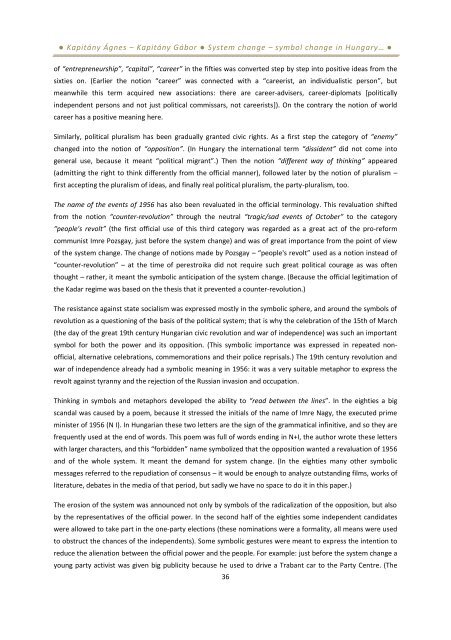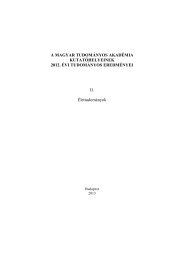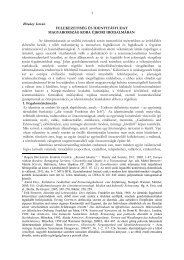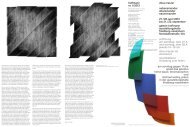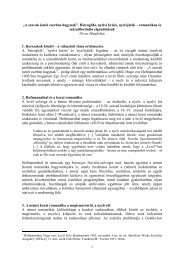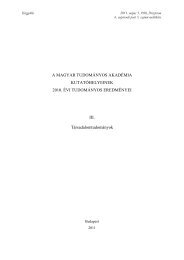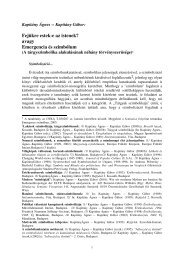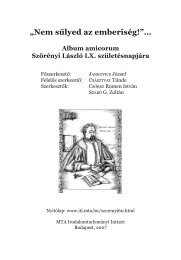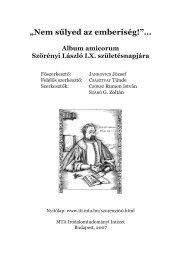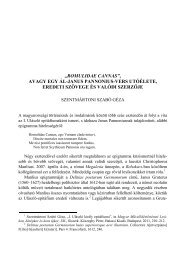symbolic elements of everyday culture - MTA Szociológiai ...
symbolic elements of everyday culture - MTA Szociológiai ...
symbolic elements of everyday culture - MTA Szociológiai ...
You also want an ePaper? Increase the reach of your titles
YUMPU automatically turns print PDFs into web optimized ePapers that Google loves.
● Kapitány Ágnes – Kapitány Gábor ● System change – symbol change in Hungary… ●<br />
<strong>of</strong> “entrepreneurship”, “capital”, “career” in the fifties was converted step by step into positive ideas from the<br />
sixties on. (Earlier the notion “career” was connected with a “careerist, an individualistic person”, but<br />
meanwhile this term acquired new associations: there are career-advisers, career-diplomats [politically<br />
independent persons and not just political commissars, not careerists]). On the contrary the notion <strong>of</strong> world<br />
career has a positive meaning here.<br />
Similarly, political pluralism has been gradually granted civic rights. As a first step the category <strong>of</strong> “enemy”<br />
changed into the notion <strong>of</strong> “opposition”. (In Hungary the international term “dissident” did not come into<br />
general use, because it meant “political migrant”.) Then the notion “different way <strong>of</strong> thinking” appeared<br />
(admitting the right to think differently from the <strong>of</strong>ficial manner), followed later by the notion <strong>of</strong> pluralism –<br />
first accepting the pluralism <strong>of</strong> ideas, and finally real political pluralism, the party-pluralism, too.<br />
The name <strong>of</strong> the events <strong>of</strong> 1956 has also been revaluated in the <strong>of</strong>ficial terminology. This revaluation shifted<br />
from the notion “counter-revolution” through the neutral “tragic/sad events <strong>of</strong> October” to the category<br />
“people's revolt” (the first <strong>of</strong>ficial use <strong>of</strong> this third category was regarded as a great act <strong>of</strong> the pro-reform<br />
communist Imre Pozsgay, just before the system change) and was <strong>of</strong> great importance from the point <strong>of</strong> view<br />
<strong>of</strong> the system change. The change <strong>of</strong> notions made by Pozsgay – “people's revolt” used as a notion instead <strong>of</strong><br />
“counter-revolution” – at the time <strong>of</strong> perestroika did not require such great political courage as was <strong>of</strong>ten<br />
thought – rather, it meant the <strong>symbolic</strong> anticipation <strong>of</strong> the system change. (Because the <strong>of</strong>ficial legitimation <strong>of</strong><br />
the Kadar regime was based on the thesis that it prevented a counter-revolution.)<br />
The resistance against state socialism was expressed mostly in the <strong>symbolic</strong> sphere, and around the symbols <strong>of</strong><br />
revolution as a questioning <strong>of</strong> the basis <strong>of</strong> the political system; that is why the celebration <strong>of</strong> the 15th <strong>of</strong> March<br />
(the day <strong>of</strong> the great 19th century Hungarian civic revolution and war <strong>of</strong> independence) was such an important<br />
symbol for both the power and its opposition. (This <strong>symbolic</strong> importance was expressed in repeated non-<br />
<strong>of</strong>ficial, alternative celebrations, commemorations and their police reprisals.) The 19th century revolution and<br />
war <strong>of</strong> independence already had a <strong>symbolic</strong> meaning in 1956: it was a very suitable metaphor to express the<br />
revolt against tyranny and the rejection <strong>of</strong> the Russian invasion and occupation.<br />
Thinking in symbols and metaphors developed the ability to “read between the lines”. In the eighties a big<br />
scandal was caused by a poem, because it stressed the initials <strong>of</strong> the name <strong>of</strong> Imre Nagy, the executed prime<br />
minister <strong>of</strong> 1956 (N I). In Hungarian these two letters are the sign <strong>of</strong> the grammatical infinitive, and so they are<br />
frequently used at the end <strong>of</strong> words. This poem was full <strong>of</strong> words ending in N+I, the author wrote these letters<br />
with larger characters, and this “forbidden” name symbolized that the opposition wanted a revaluation <strong>of</strong> 1956<br />
and <strong>of</strong> the whole system. It meant the demand for system change. (In the eighties many other <strong>symbolic</strong><br />
messages referred to the repudiation <strong>of</strong> consensus – it would be enough to analyze outstanding films, works <strong>of</strong><br />
literature, debates in the media <strong>of</strong> that period, but sadly we have no space to do it in this paper.)<br />
The erosion <strong>of</strong> the system was announced not only by symbols <strong>of</strong> the radicalization <strong>of</strong> the opposition, but also<br />
by the representatives <strong>of</strong> the <strong>of</strong>ficial power. In the second half <strong>of</strong> the eighties some independent candidates<br />
were allowed to take part in the one-party elections (these nominations were a formality, all means were used<br />
to obstruct the chances <strong>of</strong> the independents). Some <strong>symbolic</strong> gestures were meant to express the intention to<br />
reduce the alienation between the <strong>of</strong>ficial power and the people. For example: just before the system change a<br />
young party activist was given big publicity because he used to drive a Trabant car to the Party Centre. (The<br />
36


